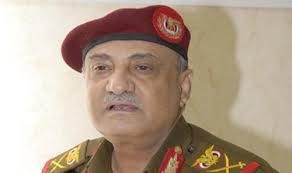
Days after Yemen Defence Minister, Major General Mohammed Nasser Ahmed and several of his aides came back from Washington where they met with US military officials to discuss Yemen’s counter-terror strategy President Abdo Rabbo Mansour Hadi declared war on al-Qaeda with an intensity and violence never witnessed before.
Amid the publication online of a video featuring a very defiant and rather smug Nasser al-Wuhayshi at a larger al-Qaeda gathering and more reports of al-Qaeda related kidnappings and killings, Yemen coalition government suddenly snapped into action against Islamic radicals, as if animated with a new sense of resolve and urgency.
April 20, 2014 would mark the beginning of a massive air strike against al-Qaeda’s positions across several of Yemen’s provinces: Shabwa, al-Baydha and Abyan, where the terror group is believed to have established several cells and training camps. On April 21, amid a broad air attack, Yemen armed forces moved on the ground in a sweep which has been termed by officials at the defence ministry as “unprecedented.”
And indeed in 48 hours Yemen armed forces are believed to have eliminated 55 terror militants, among whom key leaders: Nasser al-Wuhayshi and Ibrahim al-Asiri.
While drones have been used during the air raid both on Sunday and Monday’s attacks, Yemeni officials have refused to confirm whether Washington had anything to do with the attacks, at least in terms of technological support.
Ever since the US mistakenly targeted last December a wedding convoy, President Hadi has been under much pressure to shut down any US-led attack on Yemeni soil. And while President Hadi has on several occasions insisted drones remain, regardless of the collateral casualties, Yemen’s best line of defence against terror, sources close to the presidential palace has noted that the president aimed to play down America’s military role in Yemen as not to feed the controversy and give rights activists further ammunition against his administration.
Regardless of Washington’s role in April 20-21 operation against al-Qaeda in Yemen it remains clear that AQAP is still very much a priority for US President Barack Obama’s administration, hence the unprecedented financial and military support Sana’a was offered since 2012.
As per noted by CNN in a report earlier this week, “The US drone campaign in Yemen is very much President Obama's war.”
The strike
According to a statement released by the interior ministry on Monday, Yemen’s first air strike took place on Sunday and lasted for several hours. It was reported that on that first day at least three prominent al-Qaeda figures were killed: Mohammed Salem Abed Rabbo al-Mashibi, Fawaz Hussein al-Mahrak and Saleh Said Mahrak.
On the second day of the coordinated air and ground attack, Yemen armed forces concentrated their efforts on the valley of Wadi al-Khayala and two other locations, Lodiya and Ramtha, where terror training camps had been spotted.
Tribal leaders and local residents told reporters on the day that large pummels of smoke could be seen tunnelling above the ground at either side of the valley. A local commander, Munnaser al-Anbouri was allegedly killed in the operation.
A Yemeni security official told the Associated Press that the infrastructure of al-Qaeda training camp had been destroyed. He reportedly stressed that the offensive was based on “intelligence and regional and international co-operation.”
As officials have confirmed they are still in the process of identifying the dead, reports came out that both Nasser al-Wuhayshi and Ibrahim al-Asiri were killed in the broad attack. While Yemen will of course have to run a DNA test before confirming such news, terror experts have already noted that should indeed both al-Qaeda commanders prove to be dead, Yemen would have scored a massive victory against the terror group and most importantly hindered its ability to regenerate.
Without its most senior commanding officer and master bomber, al-Qaeda could find itself a headless movement, bound to wither and die under the unforgiving sun of Yemen.
With only a few days to go before Yemen officials are due to meet in London to discuss the impoverished nation’s funding needs, such a brilliant victory against terror will likely open up new avenues and generate more faith in President Hadi’s leadership.
reasons wives cheat on their husbands
why men cheat all wives cheat